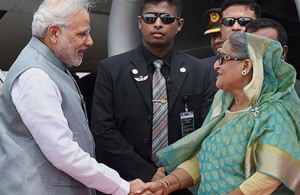Dhaka, June 6: India and Bangladesh today opened a new chapter in their ties as they settled the 41-year-old boundary dispute and promised to do more in other areas amid Prime Minister Narendra Modi's announcement of a fresh line of credit of USD 2 billion to the neighbouring country.
With West Bengal Chief Minister Mamata Banerjee standing by his side, Modi, on his maiden visit here, also expressed confidence to have a "fair solution" to the Teesta and Feni river water sharing issues with Bangladesh "with the support of state governments in India". After extensive talks between Modi and Bangladesh Prime Minister Sheikh Hasina, the two sides signed 22 agreements, including on cooperation in maritime safety and to curb human trafficking and fake Indian currency.
Hasina, whose country is seen as a hiding ground for insurgents of north east India, also promised "zero tolerance" stance against terrorism. She said the two countries agreed to set up two Special Economic Zones to bridge the growing trade deficit. Modi promised to do "everything" to address it.
He announced a fresh USD 2 billion line of credit for Bangladesh and promised quick implementation of the earlier line of credit of USD 800 million and full disbursement of USD 200 million.
The highlight of the Modi's first day here was the exchange of documents related to the Land Boundary Agreement (LBA), which paves the way for exchange of territories to settle the 41-year-old border dispute which has been an irritant.
Under the Agreement, 111 border enclaves will be transferred to Bangladesh in exchange for 51 that will become part of India. "The visit is at a historic moment. We have resolved a question that has lingered since Independence. Our two nations have a settled boundary. It will make our borders more secure and people's life there more stable," Modi said at a joint press interaction with Hasina.
Referring to the unanimous passage of the LBA by Parliament last month, he said it "reflects the consensus in India on relations with Bangladesh." Noting that the two countries had accepted the settlement of the maritime boundary last year, he said, "it is evidence of the maturity of our ties and our shared commitment to international rules. So, we stand at a moment of huge opportunity in our relationship. Prime Minister (Hasina) and I recognise that."





Comments
Add new comment